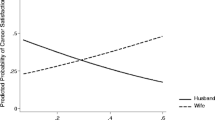Abstract
The model of the successful manager was based on the 1950's family. Thus career demands assumed the presence of a spouse at home to handle family responsibilities. This study seeks to determine whether women and men in alternate family structures will be able to succeed in managerial careers. Data were analyzed from two MBA alumni cohorts: one older cohort with three waves of data collected over a thirteen-year period and a second younger cohort with data collected in the most recent wave. A typology of family structure was utilized to categorize the managers into one of twelve family structures based on marital status, parental status, and spousal employment status. The post-traditional family where both parents are employed was found to be most prevalent for both men and women. A small percent of the MBAs were in the traditional family where the father is employed and the mother is not employed. Family structure in early career appears to be stable over the thirteen-year study period. Analyses reveal that for men, those in traditional families are most rewarded in their careers in terms of income and salary progression. Women had no family structure that achieved career success comparable to traditional family men. Despite increased acknowledgement of the varied family structures of managers and the adoption of family friendly policies by companies, rewards are not distributed equally. This has implications for managers, organizations, and society.
Similar content being viewed by others
References
Blau, F. D. and M. A. Ferber: 1986, The Economics of Women, Men, and Work (Prentice-Hall, Englewood Cliffs, NJ).
Brunner, B. (ed.): 2000, Time Almanac 2001 (Family Education Co., Boston).
Catalyst: 1998, Two Careers, One Marriage: Making It Work in the Workplace (Catalyst, New York).
Fields, J. and L. M. Casper: 2001, America's Families and Living Arrangements: March 2000. Current Population Reports, P20–537. U.S. Census Bureau, Washington, DC.
Friedman, S. D. and J. H. Greenhaus: 2000, Work and Family-Allies or Enemies?(Oxford University Press, New York).
Hennig, M. and A. Jardim: 1977, The Managerial Woman (Anchor Press/Doubleday, New York).
Hill, M. S.: 1979, ‘The Wage Effects of Marital Status and Children’, Journal of Human Resources 14, 579–593.
Kanter, R. M.: 1977, Men and Women of the Corporation (Basic Books, New York).
Korenman, S. and D. Neumark: 1991, ‘Does Marriage Really Make Men More Productive?’, Journal of Human Resources 26, 283–307.
Landau, J. and M. B. Arthur: 1992, ‘The Relationship of Marital Status, Spouse's Career Status, and Gender to Salary Level’, Sex Roles 27, 665–681.
LeLouarn, J. Y., R. Theriault and J. M. Toulousse: 1984, ‘Working Spouses' Impact on Managers' Career Progression’, Relations Industrielles 39, 36–50.
Nieva, V. F.: 1985, ‘Work and Family Linkages', in L. Larwood, A. H. Stromberg and B. A. Gutek (eds.), Women and Work, vol. 1 (Sage, Beverly Hills, CA), pp. 162–190.
Olson, J. E. and I. H. Frieze: 1987, ‘Income Determinants for Women in Business', in A. H. Stromberg, L. Larwood and B. A. Gutek (eds.), Women and Work, vol. 2(Sage, Newbury Park, CA), pp. 173–206.
Parasuraman, S. and J. H. Greenhaus (eds.): 1997, Integrating Work and Family: Challenges and Choices for a Changing World (Quorum, Westport, CT).
Pfeffer, J. and J. Ross: 1982, ‘The Effects of Marriage and a Working Wife on Occupational and Wage Attainment’, Administrative Science Quarterly 27, 66–80.
Powell, G. N.: 1999, ‘Reflections on the Glass Ceiling: Recent Trends and Future Prospects', in G. N. Powell (ed.), Handbook of Gender & Work (Sage, Thousand Oaks), pp. 325–346.
Russo, N. F.: 1985, ‘Sex-role Stereotyping, Socialization, and Sexism', in A. G. Sargent (ed.), Beyond Sex Roles (West, St. Paul), pp. 150–167.
Schneer, J. A. and F. Reitman: 1993, ‘Effects of Alternate Family Structures on Managerial Career Paths’, Academy of Management Journal 33, 391–406.
Schneer, J. A. and F. Reitman: 1995, ‘The Impact of Gender as Managerial Careers Unfold’, Journal of Vocational Behavior 47, 290–315.
Stroh, L. K. and J. M. Brett: 1996, ‘The Dual-earner Dad Penalty in Salary Progression’, Human Resources Management 35(2), 181–201.
Tharenou, P.: 1999, ‘Is There a Link Between Family Structures and Women's and Men's Managerial Career Advancement’, Journal of Organizational Behavior 20(6), 837–863.
U.S. Census Bureau: 2000, Statistical Abstract of the United States (Washington, DC).
Whyte, W. H., Jr.: 1956, The Organization Man (Simon & Schuster, New York).
Author information
Authors and Affiliations
Rights and permissions
About this article
Cite this article
Schneer, J.A., Reitman, F. Managerial Life Without a Wife: Family Structure and Managerial Career Success. Journal of Business Ethics 37, 25–38 (2002). https://doi.org/10.1023/A:1014773917084
Issue Date:
DOI: https://doi.org/10.1023/A:1014773917084




